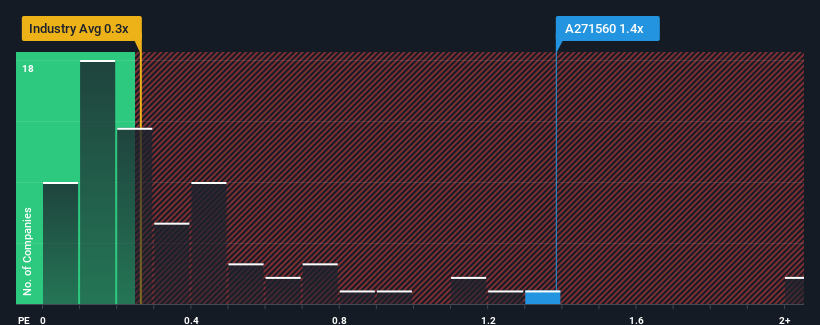When you see that almost half of the companies in the Food industry in Korea have price-to-sales ratios (or "P/S") below 0.3x, ORION Corp. (KRX:271560) looks to be giving off some sell signals with its 1.4x P/S ratio. However, the P/S might be high for a reason and it requires further investigation to determine if it's justified.
View our latest analysis for ORION

How ORION Has Been Performing
ORION could be doing better as it's been growing revenue less than most other companies lately. Perhaps the market is expecting future revenue performance to undergo a reversal of fortunes, which has elevated the P/S ratio. If not, then existing shareholders may be very nervous about the viability of the share price.
Keen to find out how analysts think ORION's future stacks up against the industry? In that case, our free report is a great place to start.Is There Enough Revenue Growth Forecasted For ORION?
There's an inherent assumption that a company should outperform the industry for P/S ratios like ORION's to be considered reasonable.
Taking a look back first, we see that there was hardly any revenue growth to speak of for the company over the past year. Still, the latest three year period has seen an excellent 31% overall rise in revenue, in spite of its uninspiring short-term performance. Accordingly, shareholders will be pleased, but also have some questions to ponder about the last 12 months.
Turning to the outlook, the next year should generate growth of 6.1% as estimated by the analysts watching the company. Meanwhile, the rest of the industry is forecast to expand by 9.0%, which is noticeably more attractive.
With this in consideration, we believe it doesn't make sense that ORION's P/S is outpacing its industry peers. It seems most investors are hoping for a turnaround in the company's business prospects, but the analyst cohort is not so confident this will happen. Only the boldest would assume these prices are sustainable as this level of revenue growth is likely to weigh heavily on the share price eventually.
The Key Takeaway
While the price-to-sales ratio shouldn't be the defining factor in whether you buy a stock or not, it's quite a capable barometer of revenue expectations.
Despite analysts forecasting some poorer-than-industry revenue growth figures for ORION, this doesn't appear to be impacting the P/S in the slightest. The weakness in the company's revenue estimate doesn't bode well for the elevated P/S, which could take a fall if the revenue sentiment doesn't improve. At these price levels, investors should remain cautious, particularly if things don't improve.
A lot of potential risks can sit within a company's balance sheet. Our free balance sheet analysis for ORION with six simple checks will allow you to discover any risks that could be an issue.
If companies with solid past earnings growth is up your alley, you may wish to see this free collection of other companies with strong earnings growth and low P/E ratios.
New: AI Stock Screener & Alerts
Our new AI Stock Screener scans the market every day to uncover opportunities.
• Dividend Powerhouses (3%+ Yield)
• Undervalued Small Caps with Insider Buying
• High growth Tech and AI Companies
Or build your own from over 50 metrics.
Have feedback on this article? Concerned about the content? Get in touch with us directly. Alternatively, email editorial-team (at) simplywallst.com.
This article by Simply Wall St is general in nature. We provide commentary based on historical data and analyst forecasts only using an unbiased methodology and our articles are not intended to be financial advice. It does not constitute a recommendation to buy or sell any stock, and does not take account of your objectives, or your financial situation. We aim to bring you long-term focused analysis driven by fundamental data. Note that our analysis may not factor in the latest price-sensitive company announcements or qualitative material. Simply Wall St has no position in any stocks mentioned.
About KOSE:A271560
ORION
Engages in the manufacture and sale of various confectionery products in South Korea, China, and internationally.
Very undervalued with flawless balance sheet.
Market Insights
Community Narratives



